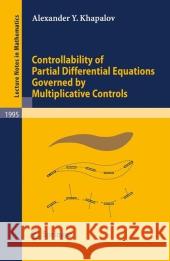Controllability of Partial Differential Equations Governed by Multiplicative Controls » książka
Controllability of Partial Differential Equations Governed by Multiplicative Controls
ISBN-13: 9783642124129 / Angielski / Miękka / 2010 / 284 str.
Controllability of Partial Differential Equations Governed by Multiplicative Controls
ISBN-13: 9783642124129 / Angielski / Miękka / 2010 / 284 str.
(netto: 191,66 VAT: 5%)
Najniższa cena z 30 dni: 192,74
ok. 22 dni roboczych
Bez gwarancji dostawy przed świętami
Darmowa dostawa!
In a typical mathematical model of a controlled distributed parameter process one usually ?nds either boundary or internal locally distributed controls to serve as the means to describe the effect of external actuators on the process at hand. H- ever, these classical controls, enteringthe modelequationsas additive terms, are not suitable to deal with a vast array of processes that can change their principal intr- sic properties due to the control actions. Important examples here include (but not limitedto)thechainreaction-typeprocessesinbiomedical, nuclear, chemicalan- nancial applications, which can changetheir (reaction)rate when certain catalysts are applied, and the so-called smart materials, which can, for instance, alter their frequency response. The goal of this monograph is to address the issue of global controllability of partial differential equations in the context of multiplicative (or bilinear) c- trols, which enter the model equations as coef?cients. The mathematical models of our interest include the linear and nonlinear parabolic and hyperbolic PDE s, the Schrodi ] nger equation, and coupled hybrid nonlinear distributed parameter systems associated with the swimming phenomenon. Pullman, WA, USA Alexander Khapalov January 2010 vii Preface This monograph developed from the research conducted in 2001 2009 in the area of controllability theory of partial differential equations. The concept of control- bility is a principal component of Control Theory which was brought to life in the 1950 s by numerous applications in engineering, and has received the most sign- icant attention both from the engineering and the mathematical communities since then."











